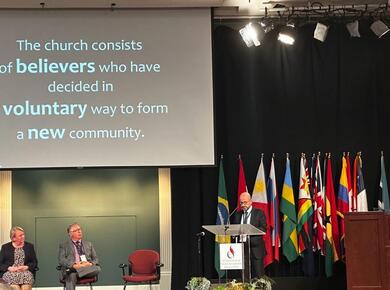Posted: October 11, 2023
A Mennonite perspective on religious freedom in 3 parts
“We, nosotros, we saved Colombia from being handed over to communists!” Those were the words of a celebrity pastor from a Colombian mega-church, spoken to a cheering crowd in California. That pastor referred to the recent success of a “No” campaign in the popular referendum that voted against implementing a peace agreement in my country. The government and the insurgent rebel group, the Revolutionary Armed Forces of Colombia (FARC), signed that agreement in 2016.1
Some years before that referendum, a Catholic priest said to me: “It is so interesting to see all these evangelical pastors looking for more political power and religious privileges while some of us as Catholics want to take distance from a close relationship with the Colombian government and all the damage and corruption it has brought to our church.”
The search for political power and privileges is increasing among evangelicals in Latin America. The close connection between some pastors and partisan politics concerns some of us as Mennonites, especially when religious Christian leaders try to impose their values on others.
How the Mennonite tradition emerged may help us understand our concerns.
Mennonite beginnings
In the shadow of the Grossmünster cathedral, the main Catholic church in Zurich, a group of young people gathered in a house to commit an act of subversion: adult baptism.
Their study of the Bible had led them to different understandings than the state church. As they understood it, baptism symbolized their conscious decision to submit to the lordship of Jesus Christ and follow his example in life – a commitment only an adult could make. That decision challenged the millennial-old practice in the Catholic Church of baptizing infants.
This radical act on January 1525 marked the symbolic beginning of what would become known as the Anabaptist (“re-baptizer”) movement. Years later, many of them were known as Mennonites.
For the Mennonites of the 16th century, the response of faith led immediately to fellowship in a community of believers through baptism. Mennonites demonstrated their voluntary, free decision to follow Christ through baptism, which at the same time was the point of entrance into the church. That, of course, implied that the church consisted of believers who had decided in a voluntary way to form a new community.
This way of understanding Christian faith and church requires the freedom to choose – your confession of faith, your values, the ethics that will characterize your life, the education you want for your children and your lifestyle as a Christian.
It also implied that there would be people who would choose differently from those who decide to follow Christ. And even those who follow Christ may choose to do it differently from one another.
To ensure the existence of a voluntary church, there must be freedom and the possibility of saying ‘no’ to Christian faith, Christian values and Christian lifestyle. Without liberty and a guarantee of freely living out decisions about religion and ethics, there won’t be a real church.
In the words of the historian William Estep: “The Anabaptists were not interested in constructing a church through coercion, either by infant baptism or by the power of the magistrate… They were concerned with gathering a church of believers who had freely responded to the proclamation of the gospel.” 2
This way of thinking rejects the idea of depending on human governments to promote the Christian faith, its values or its way of living. Indeed, looking for ways of getting legal, religious privileges over other faiths is fundamentally incompatible with this perspective.
So, how do Mennonites understand the state and their relationship with it?
Watch next month for the next article in this series.
—This three-part article is adapted from a speech MWC general secretary César García gave as a featured speaker at the 9th World Congress of International Religious Liberty Association (IRLA).
Footnotes:
1) Rebecca Bartel. “Underestimating the force of the New Evangelicals in the Public Sphere: Lessons from Colombia, South America.” The Immanent Frame, November 15, 2016, (accessed December 4, 2016). http://blogs.ssrc.org/tif/2016/11/15/underestimating-the-force-of-the-new-evangelicals-in-the- public-sphere-lessons-from-colombia-south-america/
2) William Roscoe Estep, The Anabaptist Story: An Introduction to Sixteenth-Century Anabaptism, 3rd ed. (Grand Rapids, Mich.: William B. Eerdmans Pub., 1996), 245.




Join the Conversation on Social Media
FacebookTwitterInstagramFlickrYouTube